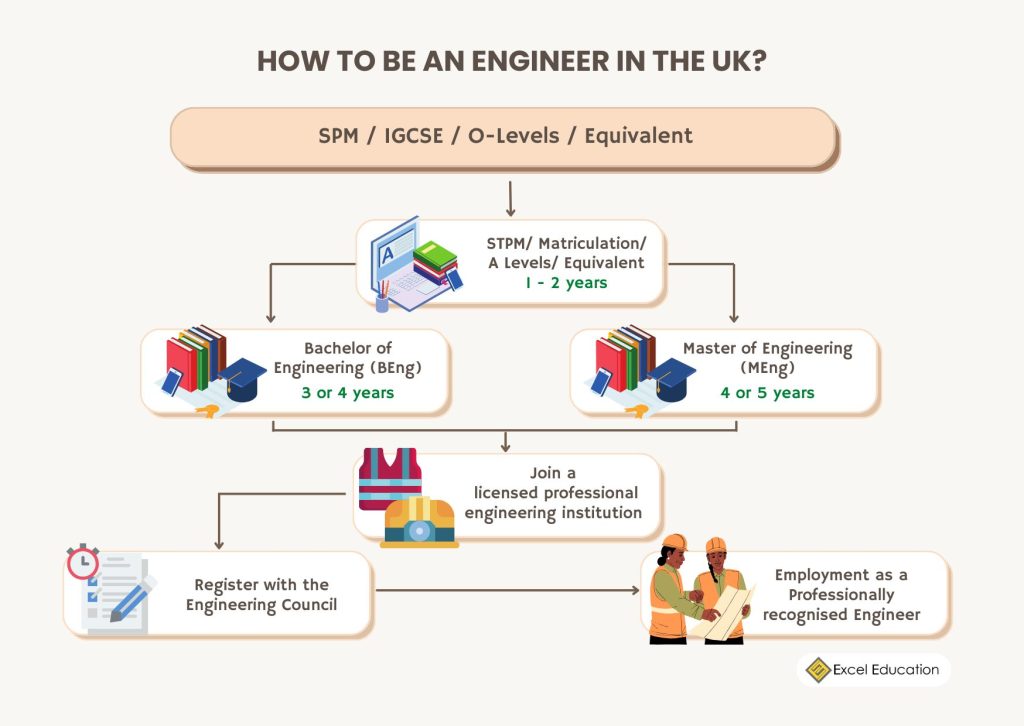
Engineers have always been the pioneers in finding solutions to the challenges of the world we live in. Innovative infrastructures, useful technologies, and efficient mechanisms definitely involved Engineering. That’s why Engineering is relevant. If you’re looking to pursue Engineering as an academic pursuit, especially in the UK, let’s unravel aspects of studying Engineering in the UK with some of the Top Universities to study Engineering in the UK.
What is Engineering?

Generally, Engineering utilises Science and Mathematics to solve problems. Engineering is a part of the STEM education that has been raved about this past decade. Examples of Engineering are actually all around us – it’s the roads, the vehicles, all the buildings around you, pharmaceuticals, and even robots! Simply, Engineering is what makes things work.
Engineers are typically involved in duties which include designing, manufacturing, building, assembly, modifying, inspecting, testing, and maintaining a multitude of products, structures, and systems.
Engineering is a field which enables you to see the fruit of your work. It is intellectually challenging and allows for lifelong learning. Additionally, careers in Engineering is in demand with potential to earn lucrative salaries.
Types of Engineering

The table below presents some of the more common branches of Engineering. For additional information, Engineering programmes in the UK offer some other options such as Aerospace Engineering, Automotive Engineering, Software Engineering, Structural Engineering, and several others.
Types of Engineering | Description |
Civil Engineering | Civil Engineering has to do with the construction of infrastructures and transportation systems. General responsibilities of those in Civil Engineering include construction analysis and management, surveying, budgeting, and planning. |
Mechanical Engineering | Mechanical Engineering primarily design, build and develop mechanical machinery, equipment, and components. Mechanical Engineering is said to be one of the broadest branches of Engineering. |
Electrical Engineering | Electrical Engineering centres on designing, testing and manufacturing electrical components as well as understanding different types of energy. There are specialisations under Electrical Engineering, such as, motors, power generation, telecommunications, among others. |
Chemical Engineering | Chemical Engineering covers notions relating to chemical processes meant to be adapted into more commercial or practical applications. This could be products like food or pharmaceuticals. |
Computer Engineering | Computer Engineering generally is responsible for developing and designing technological components, devices, and computer systems. This branch of Engineering combines Computer Science and Electrical Engineering. |
Skills Required to Study Engineering

- Affinity for Numerics & Science
An affinity for numerics and science would majorly benefit those wanting to pursue Engineering because a majority of the courses or classes included in an Engineering programme will be derivations of Maths and/or Science – not to mention, Mathematics is a requirement to enter an Engineering programme.
- Problem Solver
A key component of Engineering is problem-solving. As such, those wanting to pursue Engineering should be a problem solver at heart, finding ways to approach problems effectively and efficiently.
- Analytical Logic
Following the previous point, analytical logic or reasoning is essential for problem solving in Engineering. This skill allows you to discern appropriate actions that should be taken based on information or data.
- Attention to Detail
Taking notice to detail is crucial in Engineering. This is because even slight errors in calculations or planning can compromise progress, financials, and sometimes can even bring about dangerous harmful situations.
- Tech-Savvy
Our world is rapidly being driven by technology making being tech-savvy an essential skill, especially in the Engineering field. Engineers should have some technological proficiency in programming languages and software tools.
Career Options for Engineering Graduates
Listed below are some career options for Engineering graduates. Do note that there are various career options depending on specific branches of Engineering.
- Civil Engineer
- Engineering Project Manager
- Project Engineer
- Information Technology Professional
- Mechanical Engineer
- Programmer
- Product Engineer
- Software Developer
- Hardware Engineer
- Engineering Lecturer
Engineering allows for versatile job opportunities which are also profitable. Salaries may vary depending on several factors including the industry you decide to go into and relevant Engineering work experiences. However, it is reported that the average annual salary for an Engineer in the UK is £38,910.
Engineering Degree Entry Requirements in the UK
Academic Entry
Academic Entry | Minimum Score |
A-Levels | AAB – ABB (With A-Level Mathematics and Science Subject) |
IB Diploma | 32 (With Mathematics) |
UEC | AAABB (With Mathematics) |
STPM | ABB (With Mathematics and Science Subject) |
Matriculation | CGPA 3.00 |
Australian Matriculation (ATAR) | 88 |
Canadian Pre-University (CPU) | 82% |
Note: Universities may have different requirements. To learn more, get in touch with us!
English Language Entry Requirements
Entry Level | Minimum Score |
IELTS | 6.5 |
TOEFL | 90 |
Pearson Test of English (PTE) | 67 |
SPM 1119 | C |
Note: Universities may have different requirements. To learn more, get in touch with us!
How to be an Engineer in the UK?

In order to professionally practise as an Engineer in the UK, here are some steps to take:
Step 1: After SPM or equivalent examinations, complete a pre-university programme which grants you entry into Engineering programmes in the UK. Typically you’d need Mathematics, a Science subject, and English. Depending on which type of Engineering you want to enrol in, there may be additional requirements.
Step 2: Enrol into an Engineering degree. You have options to enrol in various branches of Engineering – civil, chemical, mechanical, electrical, and several others. You could consider enrolling into either a Bachelor of Engineering (BEng) or a Master of Engineering (MEng).
Difference between these two is that:
- MEng is an undergraduate course with an integrated Master’s.
- BEng has a duration of 3 years (4 years with placement) while MEng has a duration of 4 years (5 years with placement).
- BEng graduates can become Incorporated Engineers (IEng), however MEng graduates go on to become Chartered Engineers (CEng) because becoming a chartered engineer requires four years of study. BEng graduates would have to complete a Master’s if they want to practise with the CEng title.
Step 3: Join a professional engineering institution licensed by the Engineering Council. You can also do this while doing your Engineering programme. In this stage, you should build your portfolio and boost professional developments.
Step 4: Meet the registration criterias and register with the Engineering Council.
Step 5: Join employment as a professionally recognised Engineer with an appropriate title.
An additional information for those wanting to practise in Malaysia, Board of Engineers Malaysia (BEM) recognises the Engineering Council (EC) as a professional body. Both bodies are signatories of the Washington Accord. Thus, those who were granted an accredited degree by BEM can also register with EC.
Top Universities to Study Engineering in the UK
1. University of Edinburgh

The University of Edinburgh, established in 1583, is known as one of Scotland’s four ancient universities. The University of Edinburgh prides as a prominent tertiary education institution, with consistent rankings in the top 50 among universities worldwide. The university was ranked in the 22nd place for the 2024 QS World University Rankings, proving that the University of Edinburgh is an appropriate choice to study Engineering.
The Engineering programmes offered at the University of Edinburgh allows for students to enrol in varying Engineering disciplines in their second year of study. These programmes are also accredited by the Engineering Council so that graduates will have fulfilled the academic requirements to register as an Incorporated Engineer or will have fulfilled the partial academic requirements to register as a Chartered Engineer.
Programme Offered | BEng/MEng Engineering Major Options:
|
Duration | 4 or 5 Years |
Intake | September |
Annual Indicative Fees (2024) | International Students: £34,800 |
Disclaimer: A 5-year study duration includes industrial/professional placement.
Contact us right now for a free consultation if you’d like more details about the costs, the format of the programme, and the entry requirements!
2. University of Exeter

The University of Exeter, opened in 1838, is a notable higher education learning institution located in South West England. They are a member of the Russell Group in the UK, marking their academic excellence as a research university. Drawing from these circumstances, the University of Exeter is a suitable study destination for those looking to academically pursue Engineering.
The Engineering programmes by the University of Exeter are for those who wish to study core components of Engineering before choosing an Engineering specialism in their second year of studies. Do note that the Engineering programmes by Exeter offer a year in the industry for students to boost their employability and prepare for the professional field of Engineering.
Programme Offered | Duration | Intake | Indicative Annual Fees (2024) |
Engineering BEng | 3 or 4 Years | September | International Students: £29,700 |
Engineering MEng | 4 or 5 Years | September | International Students: £29,700 |
Disclaimer: An additional year of study duration includes industrial/professional placement.
Contact us right now for a free consultation if you’d like more details about the costs, the format of the programme, and the entry requirements!
3. University of Birmingham

The University of Birmingham, more commonly known as Birmingham University, was founded in 1825, and has since become a known public research university in the UK. The university retains the status as the original ‘redbrick’ university and is also a member of the prestigious Russell Group of the UK. If you want to pursue Engineering at Britain’s second largest city, then, the University of Birmingham’s the choice for you.
The Engineering programmes at the University of Birmingham provides flexibility for students to explore Engineering topics before deciding on which Engineering specialisation to continue in. Students have the choice to go into Civil Engineering, Electronic, Electrical and Systems Engineering or Mechanical Engineering.
Programme Offered | Duration | Intake | Indicative Annual Fees (2024) |
Engineering BEng | 3 or 4 Years | September | International Students: £28,560 |
Engineering MEng | 4 or 5 Years | September | International Students: £28,560 |
Disclaimer: An additional year of study duration includes industrial/professional placement.
Contact us right now for a free consultation if you’d like more details about the costs, the format of the programme, and the entry requirements!
For more information regarding the university, programs offered, entry requirements and fees, contact Excel Education.

Hannah Hir
Hannah appreciates various art forms, especially Asian literature, film and music. Most of her favorite Malaysian kuihs are green-coloured.

